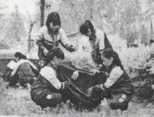题目内容
根据汉语提示写出在空缺处写出单词的正确形式。
In some western countries, some people don't like the number 13 because they think 13 is an unlucky number. For example, they don't like to live on the thirteenth floor. One evening, Mr. Smith asked some 1.(朋友) to get together. When all of his friends arrived, he asked them to sit at the table for 2.(晚餐). He began to 3.(数)the people. Suddenly, he cried out, “Oh, there are thirteen people here!” Everyone's face looked 4.(苍白的) except Mr. Brown. He said with a smile,“Don't worry, my friends. My wife will have a baby in a few weeks. So we have 5.(十四) people here.” All of his friends became happy again. “Congratulations!” They said to Mr. Brown. They all had a good time that evening.
练习册系列答案
相关题目



